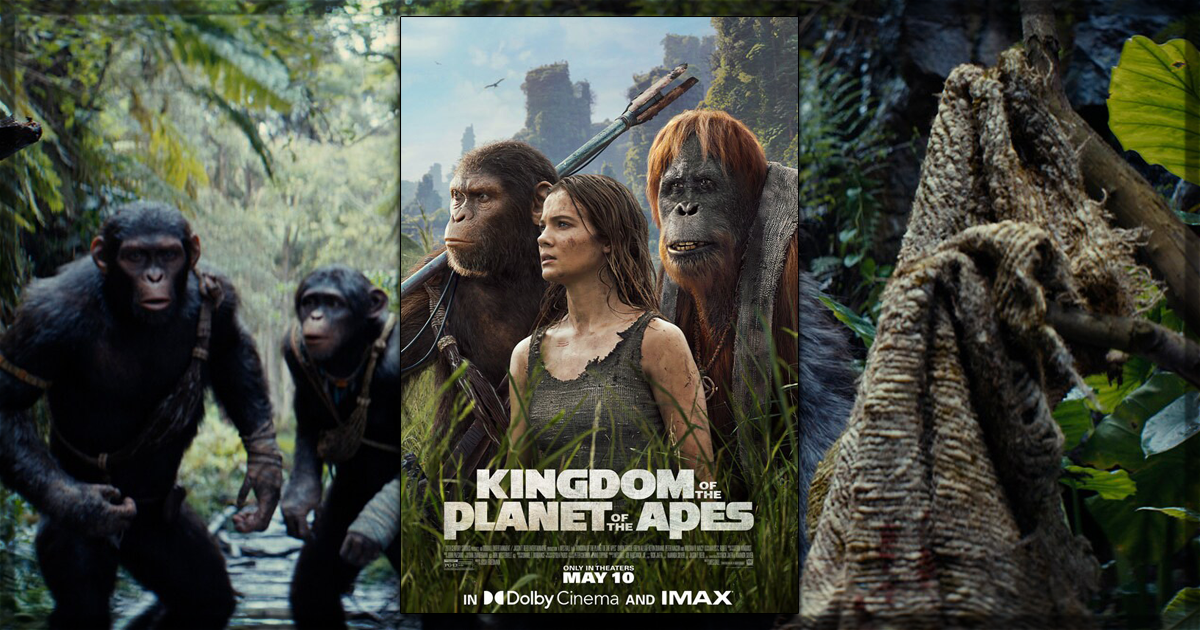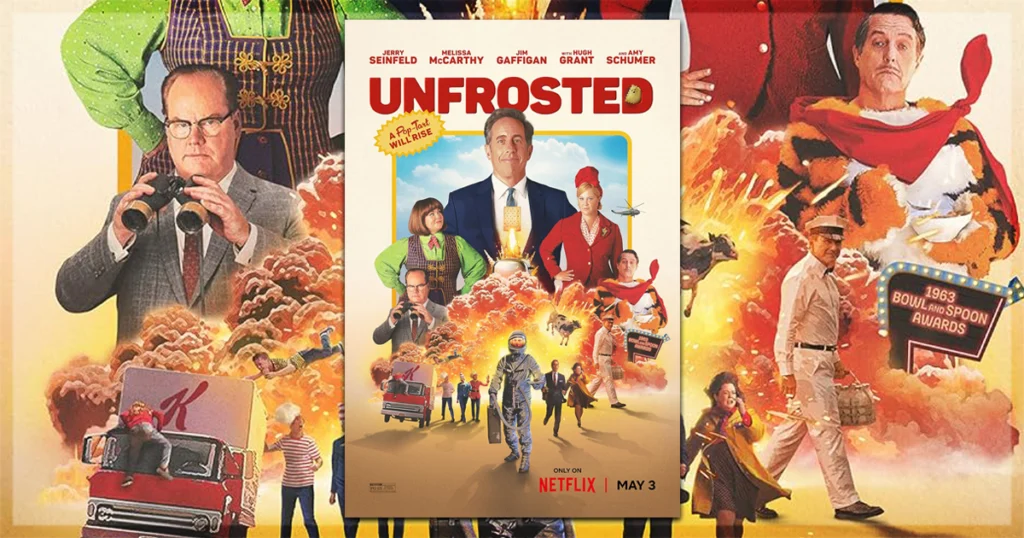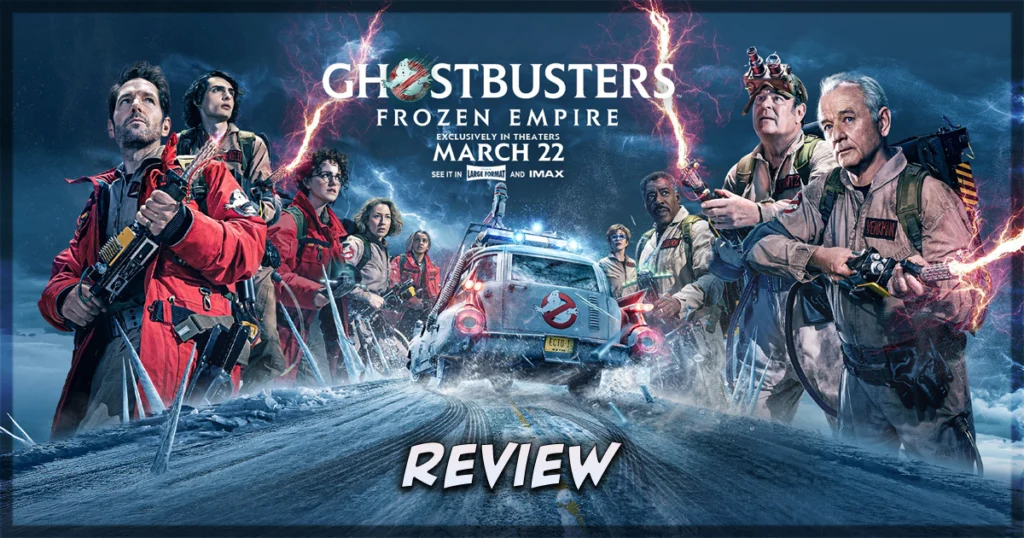Wes Ball’s Kingdom of the Planet of the Apes is a largely thrilling although imperfect continuation of the franchise.
The Planet of the Apes franchise has become a staple in cinematic history. Starting with the 1968 film of the same name, audiences were swept away to another world. That film transported viewers to a different world, showcasing the power of Science Fiction cinema. Decades later, the franchise returned with the reboot, Rise of the Planet of the Apes, in 2011. A ferocious leading turn from Andy Serkis reinvigorated the fans’ excitement for the series. Each film raised the bar, delivering both entertaining and thought-provoking Sci-Fi.
The End of an Era and the Start of Something New
In 2017, War for the Planet of the Apes wrapped an epic bow on the series. It wisely concluded Caeser’s (Andy Serkis) story on an entertaining and complex note. The franchise served as a reminder of the power of visual effects-based performances. The emotional nuance actors could bring to motion capture roles proved a revelation. It set a high bar for the future of the beloved series. With the franchise’s critical and financial success, the possibilities of a continuation were obvious. Flash forward seven years, and Kingdom of the Planet of the Apes hopes to continue the beloved franchise.
Set 300 years after the War for the Planet of the Apes, Kingdom of the Planet of the Apes presents a future after Caesar’s reign, creating a unique and intriguing continuation. The narrative follows a young ape named Noa (Owen Teague), who embarks on a journey to rescue his kidnapped family. Along the way, he encounters new allies, including an orangutan named Rakka (Peter Macon) and a human named Mae (Freya Allan). These characters and the revelations they bring add depth and complexity to the story, making it a must-watch for franchise fans.
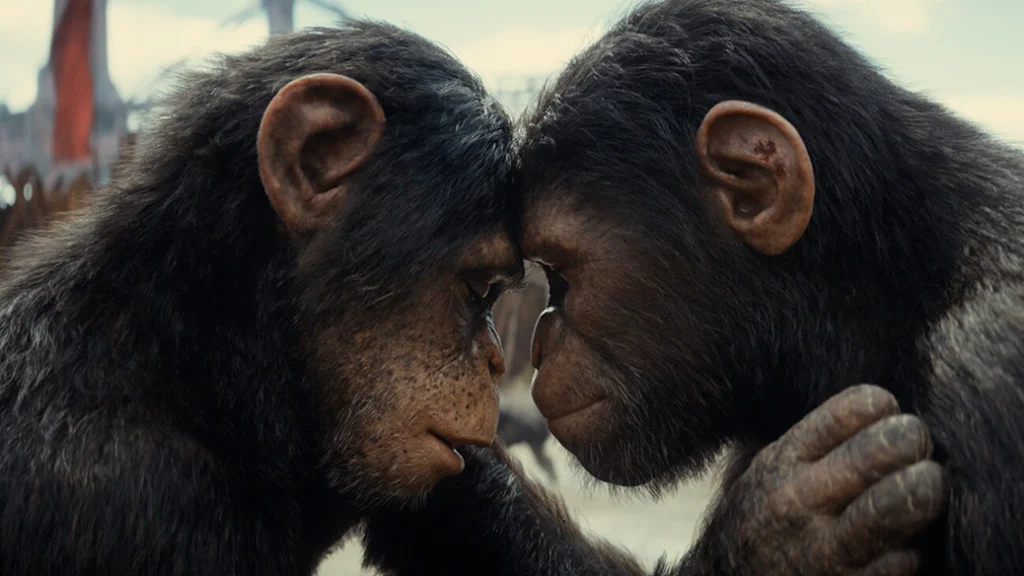
World Building and Legacy in Kingdom of the Planet of the Apes
Kingdom of the Planet of the Apes excels in its world-building, which is a testament to director Wes Ball. He deeply understands and respects the franchise’s important cinematic legacy. Ball wisely includes Caesar’s spiritual presence, both looming in the film, which helps this continuation feel organic and satisfying for die-hard fans. Ball’s adept handling of this legacy elevates the story, enhancing both the thrilling action sequences and the overall performances by the cast.
The performances can be expressive with the advancements in visual effects provided by the acclaimed studio founded by Peter Jackson, Weta Digital (the studio behind The Lord of the Rings). Each performance never feels like a CGI caricature. Owen Teague and Peter Macon successfully deliver emotional truths to the characters. These characters feel lived in and honest, making it easy to sympathize with their journeys. On the flip side, villainous characters like Proximus Caesar (Kevin Durand) succeed as being equally frightening. Like Ball in the director’s chair, the passion through the performances shines brightly. Clocking in at 145 minutes, the performances and visual splendor help deliver an enjoyable and engaging experience.
Humans in a World of Apes
That even includes the human characters, with Mae as our primary human conduit. Freya Allan as Mae has more depth than meets the eye. In the future, the human population has reverted to a primitive state. It’s exciting to see these societal roles (humans and apes) reversed, primarily through Allan’s performance. In any Planet of the Apes movie, the humans are (understandably) the least interesting piece. In this film, Mae is admittedly given a thin amount of characterization. For the most part, this is unfortunate for an actor of Allen’s ability, especially for those who know her from The Witcher. That supposed “primitive” mindset of humans gives way to fascinating story revelations. Allan effectively delivers this with her character, giving the film an exciting wrinkle of intrigue.
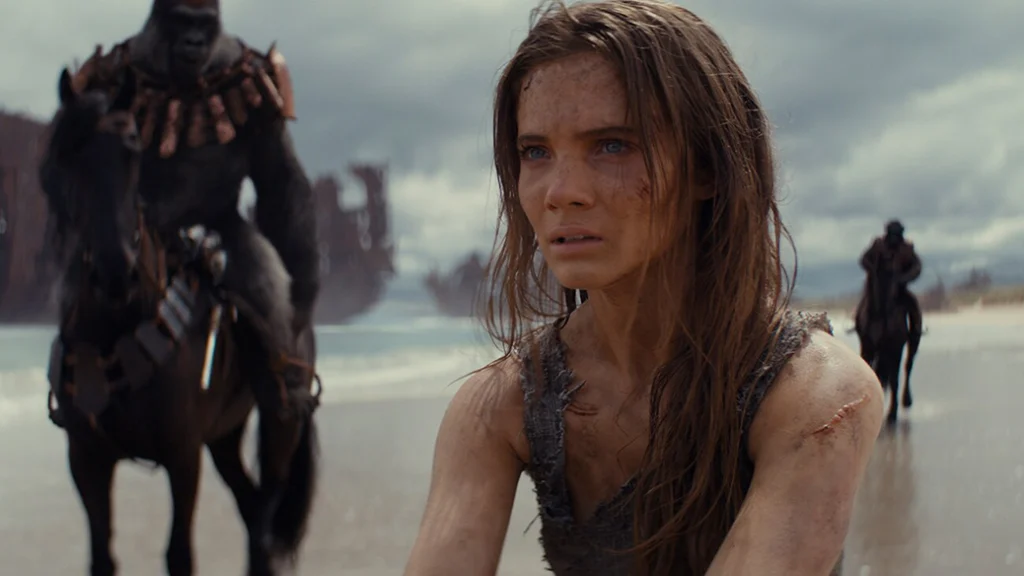
A Long Prologue Inflates the Runtime
The most significant problem with Kingdom of the Planet of the Apes resides in its overlong runtime. This mostly comes from what equates to a prologue over the film’s first 25-40 minutes. It’s easy to understand why the story needs to set up the character of Noa and those in his world. Audiences have never met them and need moments to get to know them to become emotionally invested. With those moments, a point comes to where viewers have learned what they need to know about the characters. Extending this sequence feels repetitive (by explaining the characters), which could cause audiences to feel bored. By the time the story gets going, some could struggle to make the emotional investment the film asks of them.
That problem could also affect some viewers in an overly chaotic third act. While mostly thrilling, certain narrative choices feel rather silly. That could make some of the tension feel less impactful. Granted, your likelihood of enjoying the third act resides in how much the characters have won you over. Those already on board by that point can be swept up in the thrilling final action sequences. It’s the scope of this sequence that serves as absolutely gripping entertainment. In my viewing of that spectacle, it made things easy to forgive some of the ridiculousness that occurred.
Kingdom of the Planet of the Apes: Overall Impressions
Kingdom of the Planet of the Apes had massive shoes to fill. It largely succeeds in honoring the legacy that came before. With Caesar’s looming presence, the performances (Owen Teague, Freya Allen, and Kevin Duran) pack a punch. They carry the emotional essence of protecting their people, keeping viewers engaged in their journey. Each role seamlessly fits into this already established past franchise. That helps create a film that fans of this series will immediately connect with. Those entering this series for the first time can still enjoy the ride but may struggle with the same emotional connections. While not as strong as its predecessors, the story still leaves an impressive mark. It also proves to audiences that this franchise has plenty of gas left in the tank for more adventures.

